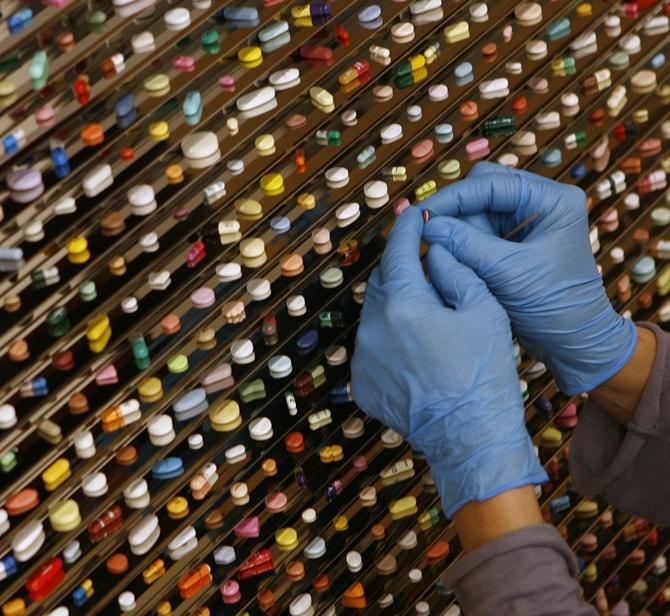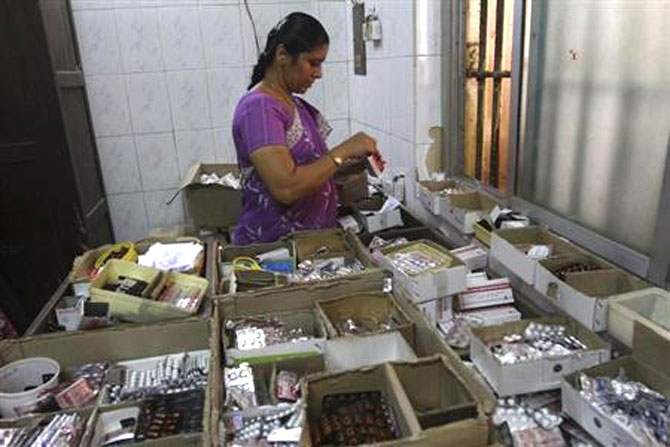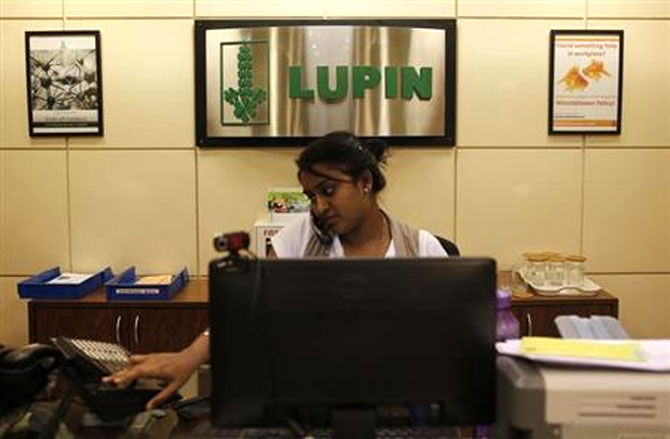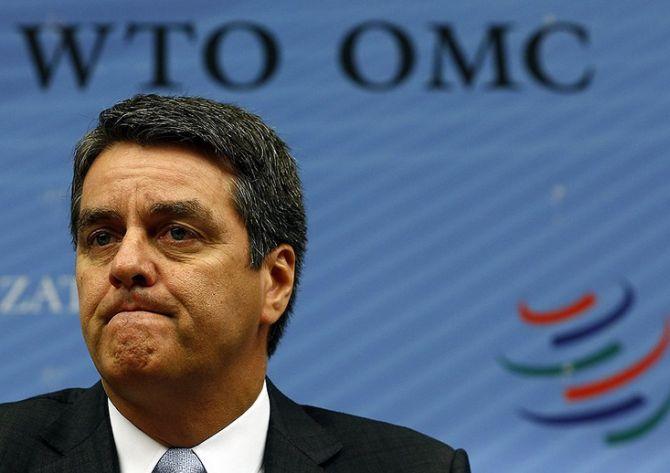Photographs: Alexandra Beier/Reuters Arvind Panagariya
The recent US-India friction over trade is being driven by Big Pharma.
Apart from the deterioration of the business environment generally, which impacts both domestic and foreign investors, retrospective taxation has figured most prominently in the media as the principal cause of growing scepticism among foreign investors.
Entirely missing from the discourse has been an equally potent factor with wholly foreign origins: the hijacking of the economic policy dialogue between the United States and India by pharmaceutical lobbies in the US.
Big Pharma has convinced the US government that the country’s interests are synonymous with its own.
With its own list of grievances against trade restrictions in India, the National Association of Manufacturers, a lobby group of the United States manufacturers, has lent its support to the pharmaceutical industry.
…
India must call the US' bluff on patents
Image: Pills in a medicine store.Photographs: Babu/Reuters
Big Pharma is currently using its considerable clout to pressure the United States Trade Representative (USTR) into designating India as a “priority foreign country” in its 2014 Special 301 Report due on April 30, 2014.
The designation is reserved for the worst offenders of intellectual property rights and triggers trade sanctions.
If the USTR obliges, the immediate impact will be the withdrawal of tariff preferences enjoyed by India on $4.5 billion worth of its exports to the US.
It is unlikely that in an election year, India will let such an act of hostility go unreciprocated. In all likelihood, it will retaliate through anti-dumping duties or outright increases in tariffs on imports from the US.
To understand what lies behind the discontent of Big Pharma, we must go back to the Uruguay Round Agreement of 1994, which gave birth to the World Trade Organisation (WTO).
Pressed by its pharmaceutical lobbies, the US had demanded a uniform 20-year patent on medicines and chemicals in all negotiating countries in the negotiations.
…
India must call the US' bluff on patents
Photographs: Jacky Naegelen/Reuters
The patent was to result in a 20-year monopoly worldwide on the sales of new drugs by the firms innovating them.
Because these firms were nearly exclusively from the rich world, most notably the US, the patent was to result in monopoly profits for these countries in all countries including the developing ones.
Therefore, India had opposed the US’ demand on behalf of the vast majority of the developing countries.
In the event, the US prevailed and the Trade-Related Aspects of Intellectual Property Rights (TRIPS) Agreement, which included the 20-year patent protection, was incorporated into the Uruguay Round Agreement.
But India’s efforts on behalf of the developing countries did not go to waste: India was successful in getting certain flexibilities inserted into the TRIPS Agreement.
Under one such flexibility, a member country could issue a compulsory licence to a local firm for the manufacture of a patented drug if the patent holder’s pricing or other actions resulted in the denial of access to the drug to most patients.
…
India must call the US' bluff on patents
Image: Lupin office.Photographs: Danish Siddiqui/Reuters
Under another provision, countries were given the option to deny patent to a drug that involved incremental innovation over an existing drug and provided no additional benefits.
Under the WTO agreement, India was required to bring its patent protection regime into conformity with the TRIPS Agreement by January 1, 2005. Accordingly, it adopted the Patents (Amendment) Act, 2005. It built the flexibilities it had negotiated into the legislation.
In the last nine years, India has used these flexibilities twice. First, in March 2012, it granted a compulsory licence to an Indian firm on an anti-cancer drug because the patent holder, German multinational Bayer, had priced out more than 95 per cent of the patients.
Second, in April 2013, India’s Supreme Court upheld a 2006 decision by the Indian Patent Office denying the Swiss multinational Novartis patent on a drug.
The Indian Patent Office and the Supreme Court argued that the patent would violate Section 3(d) of the Patents (Amendment) Act, 2005, which disallows patents to drugs representing incremental innovation and yielding no additional medical benefit over an existing drug.
…
India must call the US' bluff on patents
Photographs: Reuters
A solitary compulsory licence and a solitary denial of a patent in nine years do not amount to much by themselves.
But the reason they have worried pharmaceutical companies is that these instances may encourage a large number of other developing and even some developed countries to introduce similar provisions in their laws.
That could severely restrict the companies’ current ability to extend patents beyond 20 years through minor tweaking of drugs as their 20-year patent expires.
Critics of the Indian patent law chastise it for flouting its international obligations under the TRIPS Agreement.
When confronted with these critics, my response has been to advise them to urge the US to challenge India in the WTO dispute settlement body and test whether they are indeed right.
But nine years have elapsed since the Indian law came into force; and, while bitterly complaining about its flaws, the USTR has not dared challenge it in the WTO. Nor would it do so now. Why?
…
India must call the US' bluff on patents
Image: Roberto Azebedo, new Director-general of the World Trade Organization.Photographs: Denis Balibouse/Reuters
There is, at best, a minuscule chance that the USTR will win the case.
Against this, it must weigh the near certainty of losing the case and the cost associated with such a loss.
Once the Indian law officially passes muster with the WTO, the USTR and pharmaceutical lobbies will no longer be able to maintain the fiction that India violates its WTO obligations.
Even more importantly, it will open the floodgates to the adoption of the flexibility provisions of the Indian law by other countries. Activists may begin to demand similar flexibilities even within the US laws.
But what about possible actions against India under the Special 301 provision of the US trade law?
Ironically, this provision itself was ruled inconsistent with the WTO rules in 1999 and the US is forbidden from taking any action under it in violation of its WTO obligations. This would mean that it couldn’t link the elimination of tariff preferences on imports from India to TRIPS violation by the latter.
The withdrawal of preferences would, therefore, constitute an unprovoked unilateral action, placing India on firm footing for its retaliatory action.
Arvind Panagariya is a professor at Columbia University, New York.








article